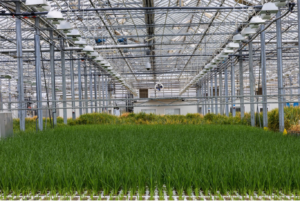Twenty-three percent more waste is generated by Americans in December than in other months of the year, according to a 2021 analysis by the Center for Biological Diversity.
One major factor is the sheer amount of packaged goods being bought. The National Retail Federation anticipates consumers will set a record this holiday season, with total spending topping $966 billion.
While some of those goods might end up being returned, re-gifted or thrown out, the packaging and wrapping they come in nearly always ends up in the trash. If gift wrap is is shiny or sparkly, it contains plastic and can't be recycled. However, some companies are dreaming of a greener Christmas and reducing waste in spite of — and sometimes because of — the holidays. Here’s how.
1. Beauty brands are reducing plastic and using full-size products in Advent calendars
Traditionally, Advent calendars count down the days leading up to Christmas with a small gift or treat behind each numbered door. They have turned into big seasonal business for companies.
Last year in the U.S., sales of prestige beauty products between October and December made up a third of the category’s $27.5 billion annual revenue for the year.
Luxury cosmetics and skincare companies often sell their own branded Advent calendars as a way to drive consumer engagement and showcase a variety of their products in one go. Big-box retailers also release Advent calendar gift sets with offerings from global luxury brands. Most of the time, companies are selling sample-sized versions in non-recyclable, single-use packaging.
But some companies are bucking the trend.
In 2020, L’Occitane en Provence redesigned its Advent calendar to replace the inner plastic mold with cellulose cardboard pulp and the outer plastic wrapping with paper. The goal, according to the company, is to use 100 percent recyclable plastic for all packaging by 2025, reducing plastic use by 40 tons compared to 2019. This year, L'Occitane is selling a fabric calendar that’s fully reusable and also offering full-size products in its bid to cut waste. Plus, it’s offering in-store recycling for empty packaging and is using only recyclable paper for gift purchases.
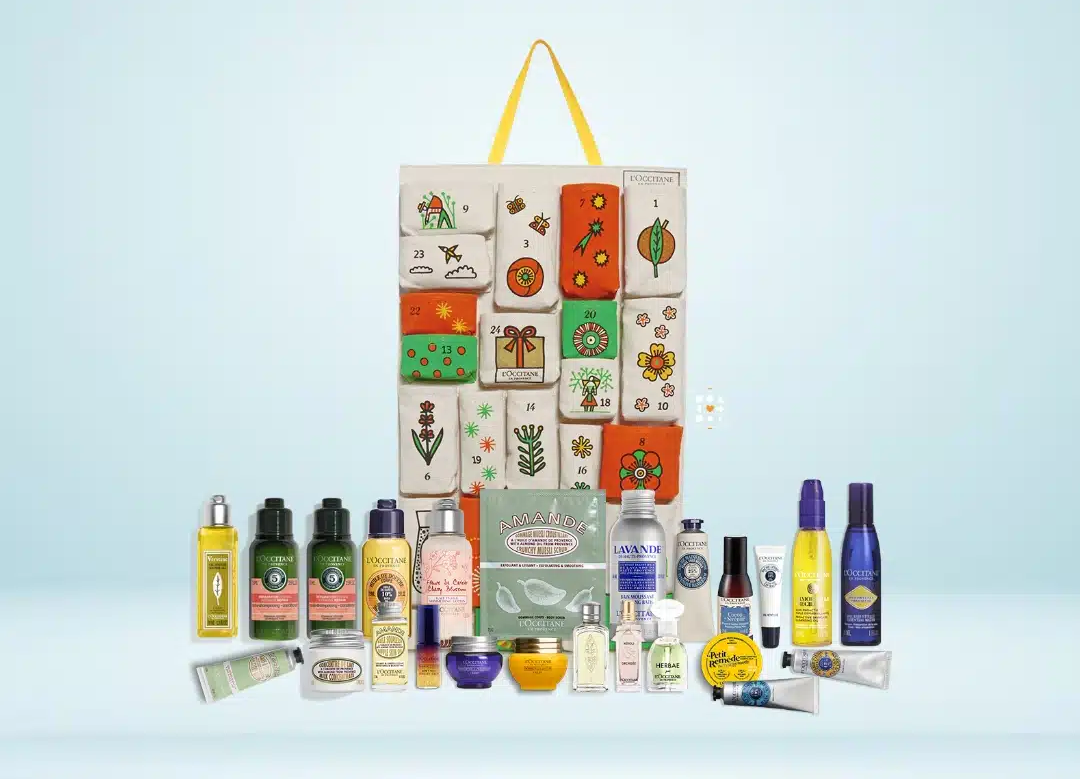
Image courtesy of L’Occitane.
Similarly, cosmetics company Aveda has started using post-consumer recycled (PCR) materials, including refillable bottles, for holiday sets, in over 85 percent of its bottles and jars. The company is trying to minimize packaging and maximize the use of recyclable and PCR materials.
2. CPG companies are using reusable packaging with fewer labels
Calvin Klein collaborated with Copenhagen-based Natural Material Studio to create a bioplastic pouch for gift wrapping made out of Procel, which is both recyclable and biodegradable. It can also be repurposed as a small purse-like bag after Christmas.
Bodycare company Lush has been selling reusable, recycled gift wrap alternatives for the past 15 years. It calls these "Knot Wraps," fabric wraps made from plastic bottles, vintage textiles or organic cotton that can be reused as scarves or more gift wrap. Several designs are on offer from artists such as Jasmine Floyd, an illustrator from Shropshire, England, and Daniel Sulzberg, a California-based artist who produced a Hanukkah-themed print.
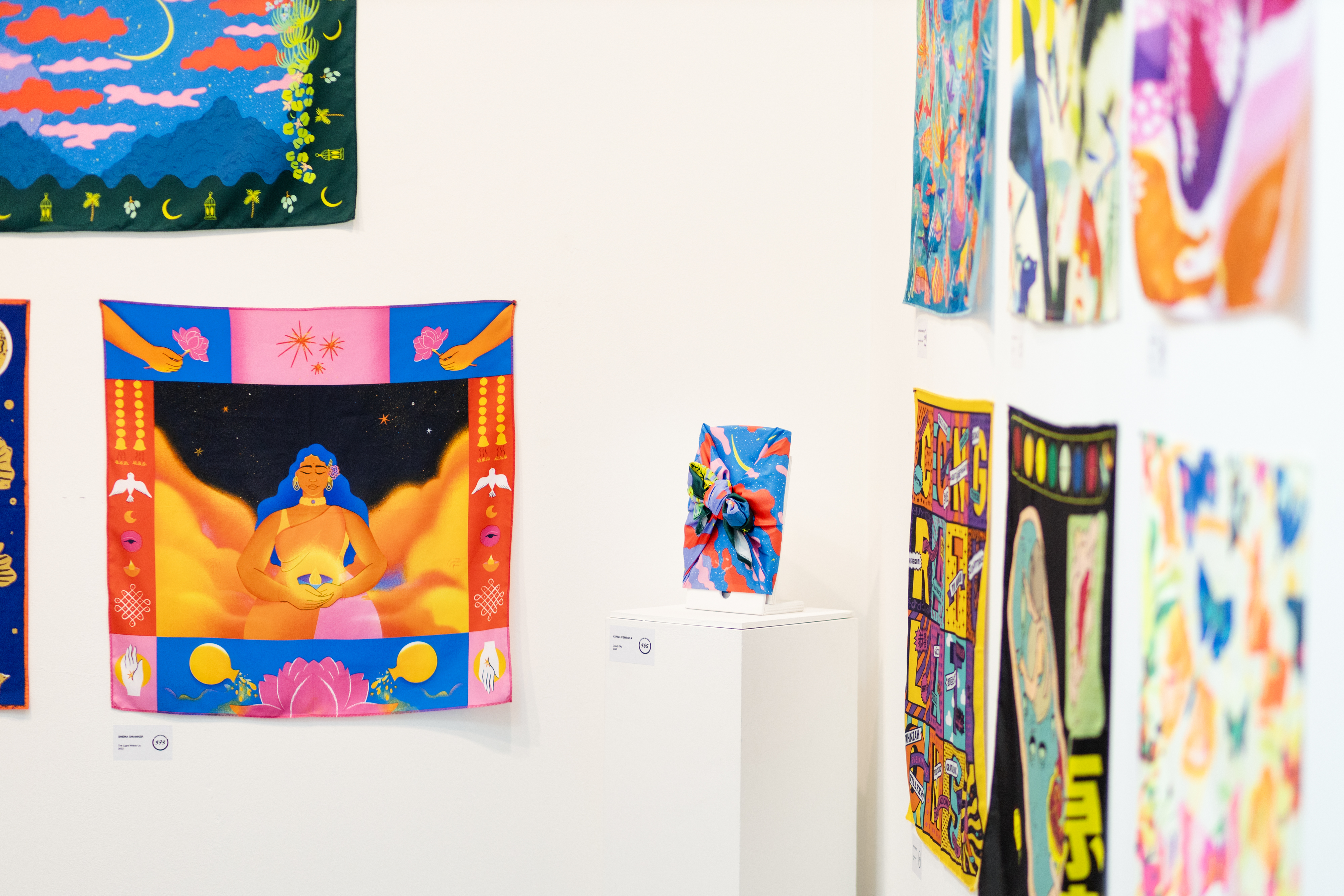
Lush wrap knots on display in Glasgow. Image courtesy of Lush.
Skincare company Pacifica is selling holiday gift sets with typos. The company made a printing error on its 2023 holiday gift set packaging, changing the intended message "YOU ARE SO pretty" to "YOU ARE OS pretty." Rather than incurring the environmental cost of reprinting, the brand launched a "One Typo = One Tree" campaign, which planted a tree for each typo-laden package.
"We work to ourselves accountable and collaborate to create solutions that go beyond our brand," Brook Harvey-Taylor, founder of Pacifica, said of the campaign.
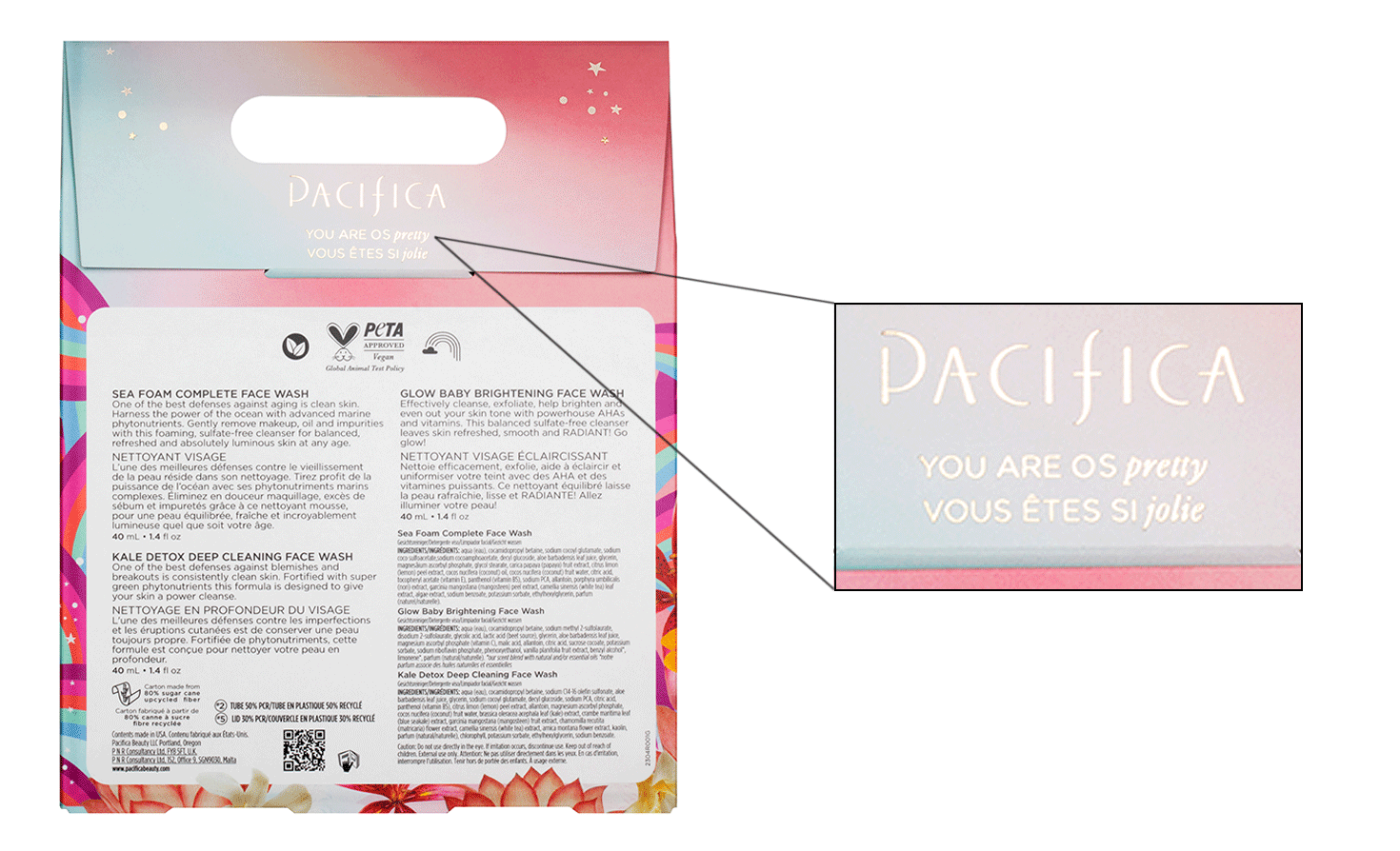
Image courtesy of Pacifica.
3. Food & beverage companies are cutting down on plastic packaging for gifts
In 2022, Diageo-owned liquor company Bacardi redesigned gift packs from several lines — including Bacardi rum, Grey Goose vodka, Martini vermouth, Patron tequila and Dewar’s scotch — to be entirely plastic-free. The spirits giant wants to remove 100 percent of single-use plastic from its gifting range by the end of 2023.
This year, Bacardi is reducing its use of cardboard gift boxes by an estimated 100 tons. The company is phasing the removal of cardboard to monitor how shoppers respond to the "naked" bottles.
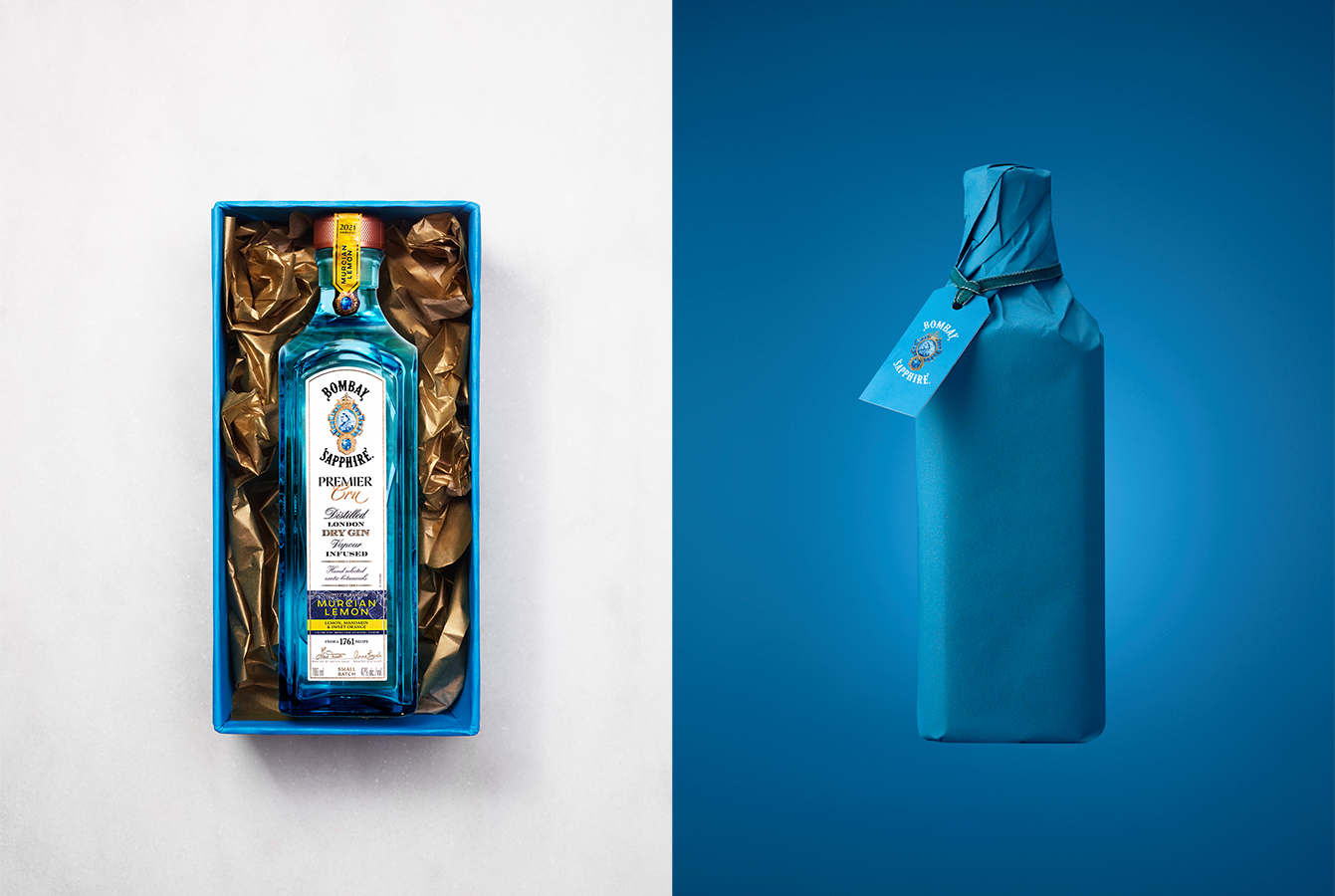
Image courtesy of Bacardi.
Will it make a dent?
Companies are fighting an uphill battle. About half of all wrapping paper — about 2.3 million pounds — ends up in a landfill every year, according to this oft-cited claim. Festive wrapping papers are notoriously hard to recycle: glitter is plastic, cheap paper is unrecyclable due to weaker fibers, and if the paper is metallic or covered in sticky tape, it can’t be recycled.
But there’s reason for hope: Half of all consumers responding to an IBM survey said they were willing to pay a premium for sustainable products.
- SEO Powered Content & PR Distribution. Get Amplified Today.
- PlatoData.Network Vertical Generative Ai. Empower Yourself. Access Here.
- PlatoAiStream. Web3 Intelligence. Knowledge Amplified. Access Here.
- PlatoESG. Carbon, CleanTech, Energy, Environment, Solar, Waste Management. Access Here.
- PlatoHealth. Biotech and Clinical Trials Intelligence. Access Here.
- Source: https://www.greenbiz.com/article/how-calvin-klein-loccitane-lush-and-others-are-waging-war-excess-christmas-packaging
- :has
- :is
- $UP
- 100
- 15 years
- 15%
- 2019
- 2020
- 2022
- 2023
- 2025
- 40
- a
- About
- According
- accountable
- advent
- After
- All
- also
- alternatives
- always
- Americans
- amount
- an
- and
- annual
- ANNUAL REVENUE
- ARE
- artist
- Artists
- AS
- bag
- Battle
- BE
- Beauty
- because
- been
- behind
- being
- between
- BEVERAGE
- Beyond
- bid
- Big
- Billion
- both
- bought
- boxes
- brand
- branded
- branding
- brands
- business
- by
- Calendar
- calendars
- Calls
- Calvin
- Campaign
- CAN
- Center
- changing
- cheap
- Christmas
- claim
- collaborate
- collaborated
- come
- Companies
- company
- compared
- consumer
- Consumer Engagement
- Consumers
- contains
- Cost
- covered
- cpg
- create
- Cut
- cutting
- Daniel
- Days
- December
- designs
- Display
- Diversity
- Door
- down
- drive
- due
- each
- empty
- end
- ends
- engagement
- England
- entirely
- environmental
- error
- estimated
- Ether (ETH)
- excess
- fabric
- factor
- Federation
- fewer
- fibers
- fighting
- Floyd
- food
- For
- founder
- from
- fully
- generated
- giant
- gift
- Global
- Go
- goal
- goods
- greener
- Half
- Hard
- Have
- Holiday
- holidays
- hope
- How
- However
- HTML
- HTTPS
- IBM
- if
- illustrator
- image
- in
- In other
- in-Store
- Including
- inner
- intended
- into
- IT
- ITS
- jpg
- launched
- leading
- lines
- Luxury
- made
- major
- make
- material
- materials
- Maximize
- message
- might
- million
- minimize
- Monitor
- months
- more
- most
- National
- Natural
- nearly
- numbered
- october
- of
- offer
- offering
- Offerings
- often
- on
- ONE
- only
- or
- organic
- OS
- Other
- Others
- our
- ourselves
- out
- over
- own
- package
- packaged
- packaging
- Packs
- Paper
- papers
- past
- patron
- Pay
- PCR
- percent
- plastic
- plato
- Plato Data Intelligence
- PlatoData
- plus
- pounds
- Premium
- Prestige
- pretty
- printing
- Produced
- Products
- purchases
- range
- rather
- reason
- record
- recycled
- recycling
- redesigned
- reducing
- release
- removal
- remove
- replace
- Respond
- retail
- retailers
- reusable
- revenue
- s
- Said
- sales
- Season
- seasonal
- sell
- Selling
- set
- Sets
- several
- Shoppers
- showcase
- skincare
- small
- So
- Solutions
- some
- sometimes
- Spending
- Spite
- started
- sticky
- studio
- such
- sustainable
- T
- tape
- tequila
- textiles
- than
- that
- The
- their
- These
- they
- Third
- this
- this year
- those
- time
- to
- tons
- Total
- treat
- tree
- Trend
- trying
- Turned
- u.s.
- use
- using
- variety
- vintage
- wants
- war
- Waste
- Way..
- we
- weaker
- were
- which
- WHO
- will
- willing
- with
- Work
- wrap
- year
- years
- you
- zephyrnet





